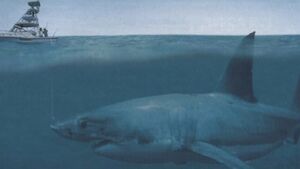The Megalodon (Carcharocles megalodon) was the world's largest shark that died out about 3.6 million years ago during the Early Miocene to the late Pilocene. At around 50-60 feet long, it dwarfed modern Great Whites. Megalodon was the largest shark ever known, and ruled the ancient ocean. The Megalodon was strong enough to eat Whales and other marine animals.
At around 3.6 million years ago the Megalodon became extinct. Despite its supposed extinction there have been several encounters with monster sharks. Some scientists think that the Megalodon could be living at the very bottom of the ocean living on whales which dive so far down.
In 1918, fishermen reported seeing a 70-foot long shark. In the sea of Cortez large massive sharks are reported to live there. In 2008 in the sea of Cortez a man on his boat crashed into a giant shark which stopped his boat instantly, the giant sharks of Cortez match the description of the Megalodon which proves that these ancient sharks may still be alive.
Etymology[]
The specific name Megalodon, translating to "big tooth", is derived from the Ancient Greek term megas, which translates to "big" and "mighty". In 1843, the Megalodon shark was given its initial binomial name, Carcharodon megalodon, by Swiss-American biologist Louis Agassiz, in his work Recherches sur les poissons fossiles, based on tooth remains.
Biology[]
Size[]
In 1973, the size of the C. megalodon was estimated by Hawaiian itchyologist John E. Randell to be about 43 feet (13 meters) in length and in the 1990s, the size was submitted by marine biologists Patrick J. Schembri and Steve Papson to be around 79 to 82 feet (24 to 25 meters) in length.
Marine biologists have speculated that mature female megalodon had a body mass of 27 to 59 tonnes (30 to 66 tons) while males may have been 13 to 34 tonnes (14 to 37 tons). They have also speculated that females ranged from 44 to 56 feet (13 to 17 meters) in length while males ranged from 34 to 47 feet (11 to 14 meters).
Teeth[]
The Megalodon had about 276 teeth in five rows that measured 18.7 centimeters in length. In Saitama, Japan in 1989, a nearly complete set of megalodon teeth was discovered. This giant shark had a bite force of a whopping 18 tons, three times more powerful than that of a Tyrannosaurus.
Paleobiology[]
Habitat[]
Fossils of the Megalodon have been found in many parts of the world: Africa, Asia, South America, North America, Oceania, and Europe. Megalodon's fossil have been found in 15 European countries, 8 North American countries, 7 South American countries, 6 African countries, 4 Oceanian countries and 3 Asian countries.
Fossils of Megalodon have mostly been found in Japan, Australia, the U.S. state of California, Venezuela, Mexico, and Austria.
Fossil locations[]
Africa[]
- Angola
- Egypt
- Libya
- Madagascar
- Nigeria
- South Africa
Asia[]
- India
- Japan
- Myanmar
Europe[]
- Austria
- Belgium
- Cyprus
- Czech Republic
- Denmark
- France
- Germany
- Italy
- Malta
- Netherlands
- Poland
- Portugal
- Slovakia
- Spain
- Turkey
North America[]
- Antigua and Barbuda
- Barbados
- Cuba
- Grenada
- Jamaica
- Mexico
- Panama
- United States (including Puerto Rico)
Oceania[]
- Australia
- Fiji
- French Polynesia
- New Zealand
South America[]
- Argentina
- Chile
- Colombia
- Ecuador
- Peru
- Uruguay
- Venezuela
Diet[]
C. megalodon preyed on dolphins, whales, and turtles, much like modern great white sharks. These included, squalodontids (which were shark-toothed dolphins), bowhead whales, sperm whales and rorquals. Megalodon were presumably cannibals, much like contemporary sharks. The shark was also an opportunistic piscivore, meaning it would have eaten small fish, as well as other sharks.
Megalodon may have competed against macroraptorial sperm whales, like Livyatan, which grew from 44 to 57 feet (13.4-17.5 meters) long.
Filmography[]
- The Land Before Time V: The Mysterious Island (1997)
- Shark Hunter (2001)
- Shark Attack 3 (2002)
- Megalodon (2002)
- Shark Attack in the Mediterranean (2004)
- Mega Shark Versus Giant Octopus (2009)
- Mega Shark Versus Crocosaurus (2010)
- Super Shark (2011)
- Jurassic Shark (2012)
- Mega Shark Versus Mecha Shark (2014)
- Mega Shark Versus Kolossus (2015)
- The Meg (2018)





